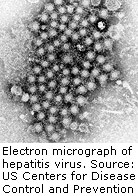Sustained virologic response for ledipasvir and sofosbuvir; and for daclatasvir and sofosbuvir
WEDNESDAY, July 22, 2015 (HealthDay News) — Combination treatments show promise for HIV and hepatitis C virus (HCV) coinfection, according to two studies published online July 21 in the New England Journal of Medicine to coincide with the International AIDS Society 2015 Conference, held from June 19 to 22 in Vancouver, Canada.
Susanna Naggie, M.D., M.H.S., from the Duke Clinical Research Institute in Durham, N.C., and colleagues conducted a multicenter study involving patients coinfected with HIV-1 and genotype 1 or 4 HCV receiving tenofovir and emtricitabine with efavirenz, rilpivirine, or raltegravir. A cohort of 335 patients received a fixed-dose combination of ledipasvir and sofosbuvir for 12 weeks. The researchers found that after 12 weeks of therapy, 322 patients (96 percent) had sustained virologic response. Among those with HCV genotypes 1a, 1b, and 4, the sustained virologic response rates were 96, 96, and 100 percent, respectively.
David L. Wyles, M.D., from the University of California, San Diego, and colleagues conducted an open-label study involving 151 patients who had not received HCV treatment and 52 previously treated patients — all with HIV-HCV coinfection. Patients were randomized to receive 12 or eight weeks of daclatasvir plus sofosbuvir daily. The researchers found that among untreated patients, a sustained virologic response was reported for 96.4 percent of patients with genotype 1 who were treated for 12 weeks, and for 75.6 percent of those treated for eight weeks.
“Among previously untreated HIV-HCV coinfected patients receiving daclatasvir plus sofosbuvir for HCV infection, the rate of sustained virologic response across all genotypes was 97.0 percent after 12 weeks of treatment,” Wyles and colleagues write.
The Naggie study was funded by Gilead Sciences; the Wyles study was funded by Bristol-Myers Squibb.
Copyright © 2015 HealthDay. All rights reserved.








